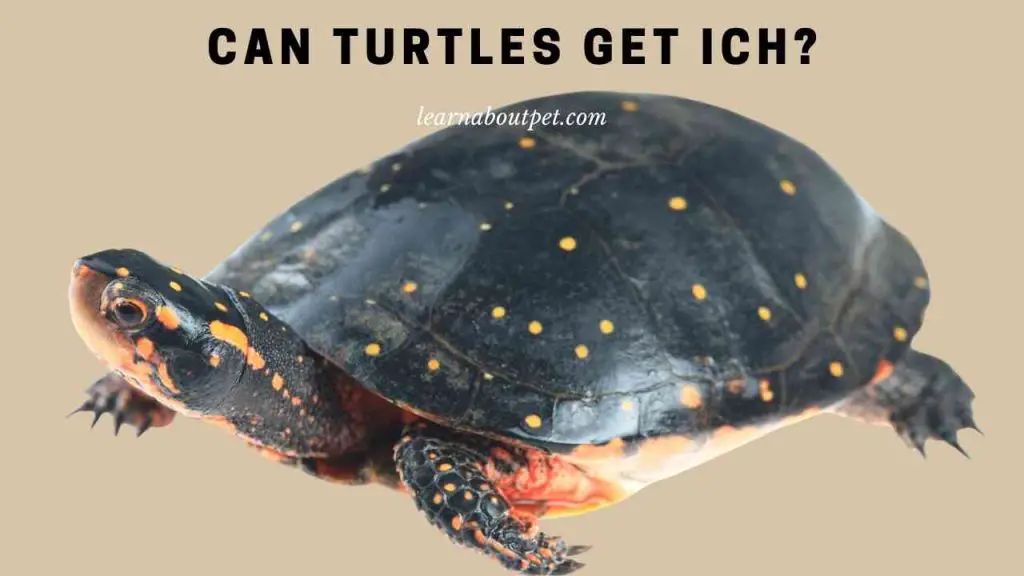Have you ever seen a white spot on your turtle shell? There are several possibilities for your turtle to have white spot disease, and one of them can be easily treated. Many equate the white spot on the turtle shell with the ich that often occurs in freshwater fish.
Can turtles get Ich? Turtles and other reptiles cannot get Ich from fish. If there is a white spot on the shell, it is not because of Ich, but could be due to other reasons. The primary causes of white spots are shedding of the skin and scutes, shell rot, and mineral deposits.
To know about Ich with its probability on the turtle or to know the cause of white spot, let’s read this article to the end.

Can Ich Infect Turtles?
Turtles cannot be infected with the ich parasite. Even though turtles cannot get ich, it doesn’t mean you have to let bad water conditions and fish that have been exposed to ich in severe conditions. The turtle will not be affected by any effect. You can use ich cure for your fish in the same tank.
Although turtles will not be disturbed by ich, you should separate contaminated fish into other tanks to avoid other fish from being exposed to the same parasite until you can ensure their condition improves.
Can Turtles Get White Spot
The white spot on turtles is not the same as the ich in freshwater fish. White spots can appear in either small or big areas and can appear on the legs or neck.
Because several possibilities can cause white spots on turtles, the table below is a brief explanation of some of the causes.
| What cause | Explanation |
| Mineral deposits | It occurs because hard water contains high amounts of magnesium and calcium carbonate. The calcium carbonate will fall to the bottom and stick to the turtle’s shell. |
| Shell rot | Ulcerative shell disease. Start with small spots and patches, and grow wider overtime. |
| Shedding skin and scutes | It might be normal shedding or abnormal shedding. Shedding scutes have a white appearance underwater. Abnormal shedding causes thicker layers will shed off and leads to other severe symptoms like bleeding or red patches. |
If you have a red-eared slider or other small turtles, you might think about ich in small turtles, but it could be just mineral deposits.
Can Turtles Get Sick From Fish?
Certain diseases that occur in fish, such as ich cannot be transmitted to turtles. Turtles can only get sick along with fish if your tank has poor water quality or a poor diet.
If your turtle eats fish, the spiny bones can cause internal damage or throat injury. That’s the probability turtles can get sick from fish.
Can turtles get Ich? Turtles cannot get Ich, but it is still possible if the turtle gets white spot disease due to other causes.
Can Humans Get Ich From Fish?
No, the human cannot get ich even if you touch aquarium water with fish contaminated with the ich parasite. Although you won’t be affected by any of these, ensure you wash your hands with soap to avoid spreading the ich to other tanks through your hands.
Parasite ich will only exist in fish because humans are not suitable hosts. Humans might be infected by ich if exposed to water in open wounds, or drinking water contaminated with ich.
Is Ich Treatment Safe For Turtles?
Ich will not harm turtles, but turtles can get white spots due to other causes. If you want to use a super cure ich, use it directly in the tank even if there is a turtle in it. A turtle will not be disturbed by this treatment.
If you are unsure and afraid of harming your turtle, transfer the turtle to another tank, and clean the entire tank with bleach solution. It will kill any bacteria or parasites. Let the tank sit for ten minutes and rinse with clean water. Wait for the tank to dry, and then refill the tank with clean water.

Can Turtles Get Ich From Fish?
No, the turtle cannot get ich. Parasites or bacteria in fish can only make a turtle hard if consumed. Turtles can only get the disease from other turtles. Salmonella is one of the bacteria that can cause turtles to get sick.
Do turtles eat fish? Fish is a source of calcium if eaten to the bone. But not all fish are safe to eat because the spine can cause a choking hazard.
Can Ich Affect Turtles?
There are no reports showing turtles getting ich from fish. Ich parasites on fish cannot be transmitted into turtles. Some symptoms resemble ich with white spots on the shell, but they are different from parasite ich.
White spots on turtles have several factors. Some of them are harmless to turtles. In contrast to fish, if exposed to ich disease, one of the final treatments is euthanizing.
Can Turtles Get White Spot?
Yes, turtles can get white spots. One that is harmless due to mineral deposits. It is harmless and can be removed by using a mixture of vinegar and water. Gently rub the turtle’s shell with a soft toothbrush, and let them dry before putting it back in the tank.
Repeat the process once a week until the deposit is gone from the turtle’s shell. If you notice any white spots due to the shedding process, let it happen naturally and don’t interfere with the process to avoid irritation.
What To Do If You Catch A Turtle With Ich?
If the turtle is in a tank with infected fish, then you must wash the turtle thoroughly with soap, and avoid soap from the turtle’s eyes. Any water with ich-infected fish can channel it to other tanks through your hands, or a wet turtle.
Let the turtle dry or dry it directly in the sun to kill parasites that may stick to the turtle’s body. Can turtles get ich? No, but water in the same tank can spread ich to other tanks when you enter the turtle without washing it first.
Can Red Eared Sliders Get Ich?
Any turtles can’t get ich. The red-eared sliders remain in the same tank as the fish affected by the ich, even though the water has been contaminated.
Can turtles get ich? Red-eared sliders can get white spots like other turtles due to shedding or mineral deposits, but can’t get white spots due to fish disease.
What Should I Do If My Turtle Has White Spots?
An explanation for removing mineral deposits is above. Now, what if there is a white deposit from the shell rot? First, ensure the turtles have a basking area to dry their body.
Scrub the shell rot with lukewarm water and a soft toothbrush to remove any dirt. After the shell is dry, you can provide silver sulfadiazine ointment or iodine to the affected area. Let the shell dry for at least an hour before you put the turtle back into the tank.
Repeat the process daily for the next three weeks. If you feel inadequate with the treatment, change the filter media and water constantly while treating the turtle from the shell rot.
Final Verdict – Can Turtles Get ich
Can turtles get Ich? Turtles cannot be affected by ich or ick from any fish. The turtle can still stand being in a tank with infected fish. You can use the ich treatment in the tank even if it’s a turtle inside, and it won’t cause any harm to them.

Turtles have white spot disease due to several factors, such as mineral deposits, shell rot, or shell and scute shedding. Mineral deposits will not cause any harm to turtles and can be cleaned easily.
Abnormal shell shedding or shell rot may cause any harm to turtles, but you can treat them until they recover.
As a pet lover, make sure to learn about pet more and give your pet turtle a good and comfortable life!

Welcome to Learn About Pet. My name is Rajkumar Ravichandran and I love all pets, travel, and amazing food. I write about my passion and personal experience caring for multiple pets in this blog! ❤️
Post Disclaimer
DISCLAIMER: THIS BLOG OR WEBSITE, "Learn About Pet", DOES NOT PROVIDE YOU WITH MEDICAL ADVICE AND IS NOT A SUBSTITUTE FOR MEDICAL ADVICE. ALWAYS GET IN TOUCH WITH YOUR PERSONAL VETERINARIAN AND USE INFORMATION HERE AS GENERAL ADVICE.
The information, including but not limited to, text, graphics, images and other material contained on this website are for informational purposes only. No material on this site is intended to be a substitute for professional veterinary advice, food recommendation, diagnosis, or treatment. Always seek the advice of your veterinarian or other qualified health care provider with any questions you may have regarding a medical condition or for pet food related questions.







